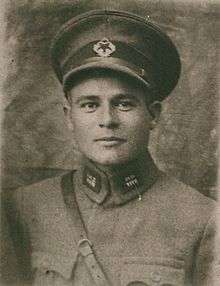Menemen Incident
The Menemen Incident (Turkish: Kubilay Olayı or Menemen Olayı) refers to a chain of events which occurred in Menemen, a small town near İzmir in the Aegean region of Turkey, on 23 December 1930. A memorial ceremony is held by the Turkish army annually on 23 December at the Martyr Kubilay Memorial (Turkish: Şehit Kubilay Anıtı) located on a hill over-looking Menemen; in remembrance of Lieutenant Mustafa Fehmi Kubilay and the two municipal watchmen Bekçi Hasan and Bekçi Şevki who were killed in the incident. The monument features a tall sculpture by Ratip Aşir Acudoğu which was erected in 1932. The Kubilay Memorial is a part of Kubilay Barracks, but open to the public. The area is landscaped and illuminated at night. A military honor guard stands continuous watch at the memorial site, which contains the graves of several Turkish soldiers who were killed in the line of duty. In the aftermath 28 people were hanged by the neck.[1]

Rebellion
Following the signing of the Treaty of Lausanne in 1923, the Republican People's Party of Turkey pursued a somewhat liberal policy towards Islam, promoting secularism while not taking a hard line against Islamic institutions and practices, believing that the secularism of their ideology was already taking root.[2] This confidence was shaken on 23 December 1930, when Dervish Mehmet Efendi, a member of the Naqshbandi (Turkish: Nakşibendi) order, created a protest by rallying an armed crowd against the policies of the secular government and calling for the restoration of Sharia and the Caliphate. A squad of soldiers from the local garrison was sent to quell the demonstration. One of the soldiers fired (using wooden bullets) upon the demonstrators and a riot ensued. The crowd then killed and beheaded the commanding officer of the squad, Lieutenant Mustafa Fehmi Kubilay, and placed his severed head on a pole with a green flag before parading through town with it. Two municipal watchmen; Bekçi Hasan and Bekçi Şevki were also killed by the demonstrators. Several rioters were also killed.[3]
Government reaction
The new republican government of Turkey was shocked by the demonstration of religious fervor and by how readily it was embraced by some Turks, as it was completely antithetical to secularism. A state of emergency was declared and courts-martial were established which meted out sentences ranging from death at the gallows or life imprisonment to one years confinement. There were also several acquittals. Sufi members were arrested around the country.[1] Furthermore, it demonstrated that secularism was taking hold neither as quickly nor as deeply as the government would have liked.[3] This spurred the government to action, and they began a more aggressive secularization reforms in response to the Menemen incident. The government carried out this policy by attempting to nationalise Islam through performing the Adhan (Turkish: Ezan) or call to prayer, in Turkish rather than Arabic. The government furthered secularization in schools by having the Quran translated from Arabic into Turkish and read to the people on the radio and in the mosques in Turkish.[4] These attempts reflected a comprehensive effort by the government to remove Islamic influences and entrench nationalism more deeply in Turkish culture. These efforts also reflected a larger attempt on the part of the government to consolidate Turkish traditions and promote aggressively Turkish nationalism to replace the last vestiges of nostalgia for the abolished Caliphate and the broken-up Ottoman Empire in the aftermath of World War I.
Notes
- Atabaki, Touraj. The State and the Subaltern. p. 154.
- Ahmad, Feroz (April 1988). "Islamic Reassertion in Turkey". Third World Quarterly. 10: 750–769. doi:10.1080/01436598808420080. JSTOR 3992665.
- Kadioğlu, Ayşe (April 1996). "The Paradox of Turkish Nationalism and the Construction of Official Identity". Middle Eastern Studies, Vol. 32, No. 2. 32: 177–193. doi:10.1080/00263209608701110. JSTOR 4283799.
- Atabaki, Touraj (2007). The state and the subaltern: modernization, society and the state in Turkey: modernization, society and the state in Turkey and Iran. Library of modern Middle East studies. 66. London: I.B.Tauris.
References
- Ahmad, Feroz. Turkey: The Quest for Identity. Oneworld Publications, 2004.